Key takeaways:
- Peer editing fosters collaboration, building confidence through shared experiences and diverse perspectives.
- Setting clear goals enhances the peer editing process, making feedback sessions more focused and productive.
- Engaging with feedback positively transforms writing; viewing critiques as growth opportunities is vital.
- Handling emotional responses and balancing honesty with kindness in critiques are essential for effective peer feedback.
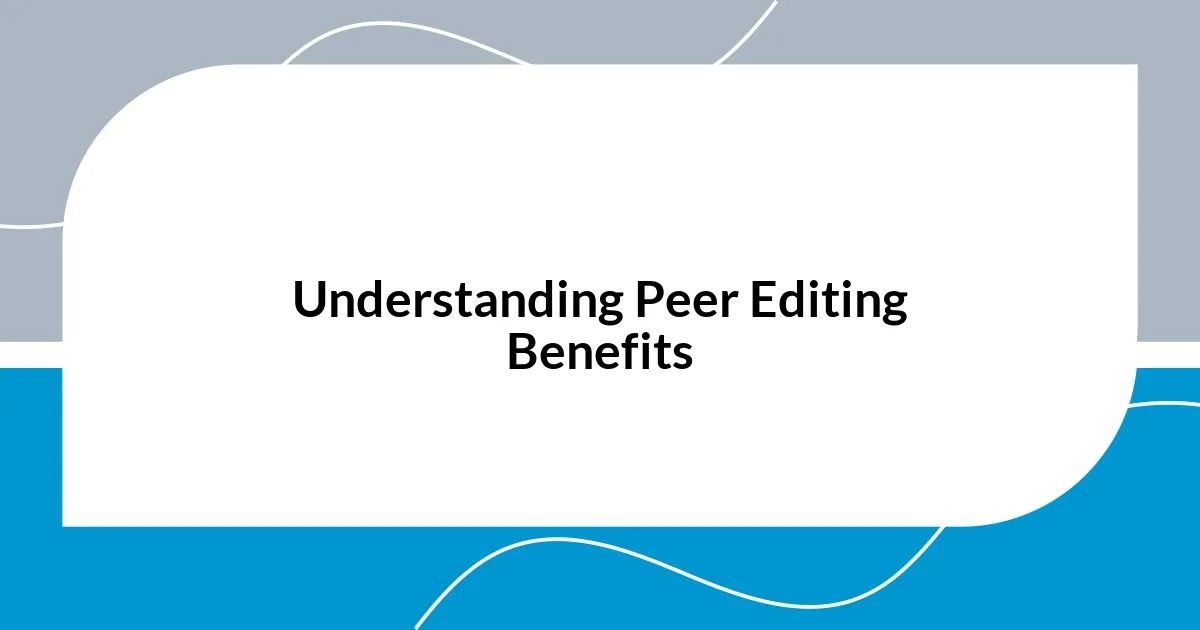
Understanding Peer Editing Benefits
Peer editing opens up a world of collaboration that can enhance both writing skills and confidence. I remember the first time I participated in a peer editing group; the feedback wasn’t just about grammar or structure, it was a revelation. Seeing my classmates struggle with similar issues made me realize I’m not alone in this journey, fostering a sense of community that was both comforting and motivating.
When I think about the diversity of perspectives in a peer editing session, it’s exhilarating. Each editor brings their unique viewpoint, which often highlights areas for improvement I had never considered. For instance, one friend pointed out how my tone felt too formal for a piece meant for a younger audience—this insight opened my eyes to the importance of adjusting style according to the target reader. Have you ever experienced that “aha” moment when someone else helps you to see your work in a new light?
Moreover, providing feedback teaches us as much as receiving it. I recall the moment I had to articulate what I loved and found confusing in someone else’s work. It forced me to dissect writing choices and consider my preferences critically. This process not only deepened my understanding of effective writing techniques but also honed my ability to communicate constructive criticism in a supportive manner. Isn’t it fascinating how the act of helping someone else ultimately helps us grow too?
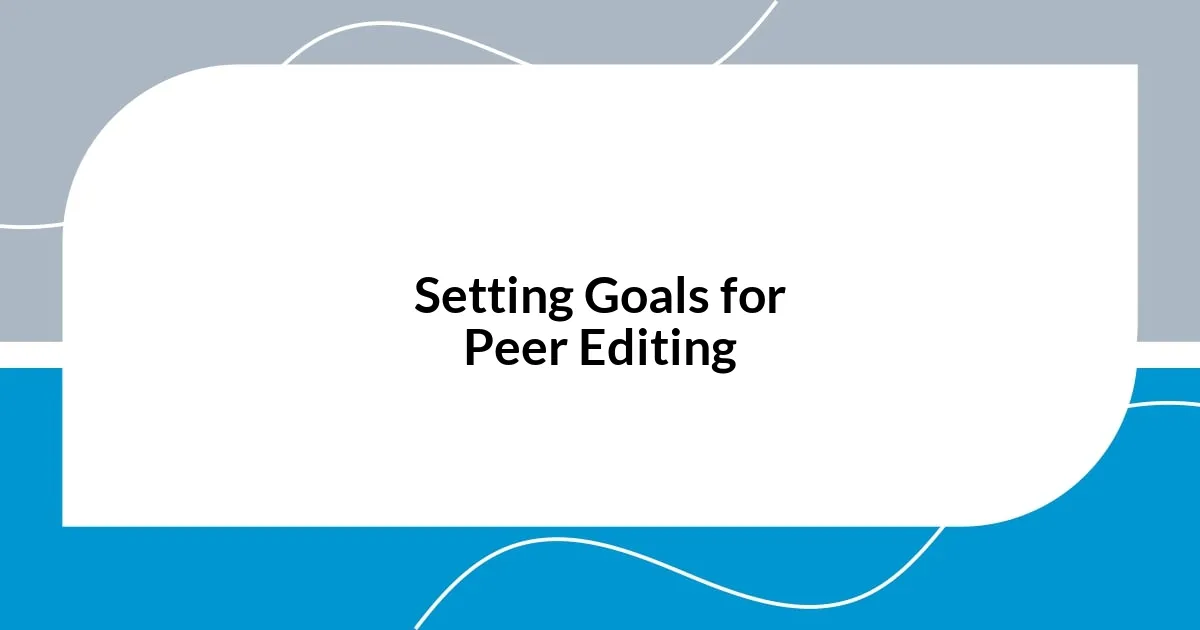
Setting Goals for Peer Editing
Setting clear goals for peer editing can significantly enhance the experience for both the writer and editor. In one session, I remember aiming specifically to improve the clarity and cohesion of my classmate’s essay. By focusing our efforts, we were able to not only pinpoint areas of confusion but also brainstorm effective transitions that made the piece flow more naturally. It felt rewarding to see how our shared focus led to tangible improvements both in the writing and our collaboration.
When setting these goals, consider the following:
- Identify specific elements to focus on, such as tone, clarity, or structure.
- Communicate those goals clearly with your peer before starting.
- Be open to adapting your goals based on the feedback you receive.
- Reflect on your own writing goals and how this peer feedback fits into that vision.
- Aim to foster a supportive environment where constructive criticism is welcomed.
By articulating precise objectives, I found that our feedback sessions became more purposeful. I will never forget how one small goal regarding argument strength transformed a friend’s hesitant assertions into confident, persuasive statements. It’s moments like that which truly highlight the power of effective peer editing.
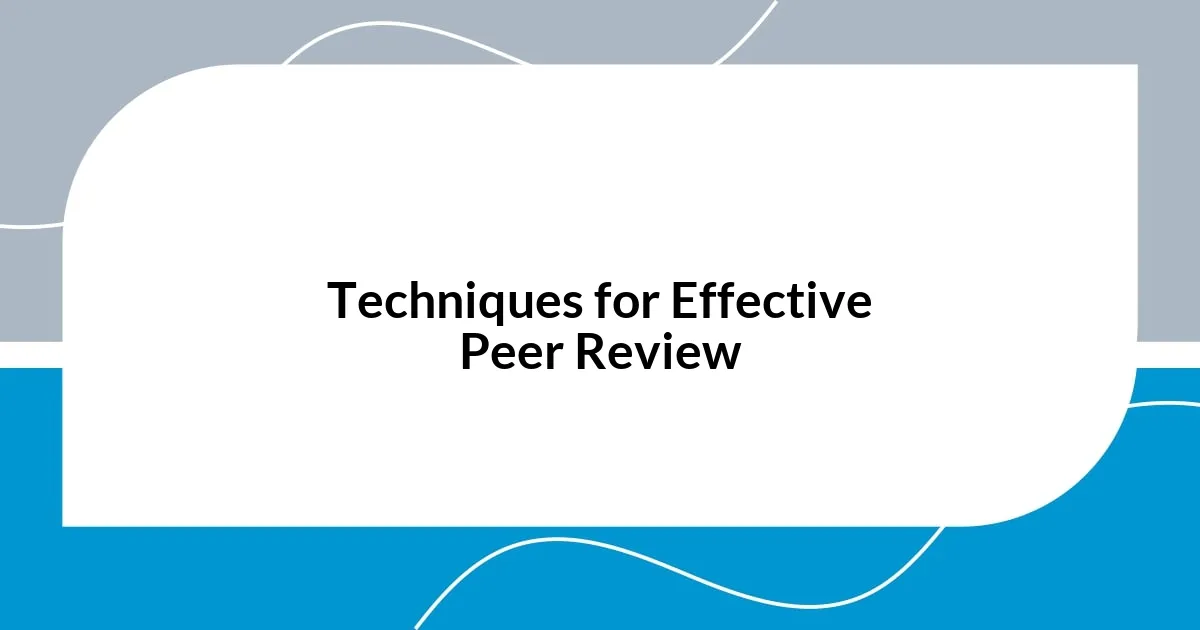
Techniques for Effective Peer Review
When engaging in effective peer review, I’ve discovered that asking specific questions can lead to deeper insights. Instead of simply saying, “What did you think?” I’ve found that asking something like, “Did the main argument resonate with you?” prompts a more focused discussion. This technique has transformed feedback sessions for me; I recall one instance where this approach led to an insightful debate about the clarity of the thesis statement. The intensity of that dialogue made it clear how critical precise questioning can be.
Another technique I cherish is the “compliment sandwich” method. I remember using this approach with a classmate who was feeling fragile about sharing their work. By starting with something positive, followed by constructive critique, and concluding with another compliment, I could offer feedback that felt supportive rather than harsh. This experience reinforced for me that the tone and delivery of feedback can significantly influence a writer’s receptivity to suggestions.
Additionally, I’ve learned the value of providing examples to clarify my feedback. I once had a peer who suggested I rearrange sections in my dissertation but didn’t say why. I found it more effective when I showed her how certain transitions could enhance coherence. This not only illustrated my points more effectively but also fostered collaborative exploration of ideas. Sharing concrete examples, I believe, helps bridge understanding and encourages mutual growth.
| Technique | Description |
|---|---|
| Specific Questions | Encourages focused feedback by prompting deeper discussion. |
| Compliment Sandwich | Offers constructive criticism in a supportive manner to foster confidence. |
| Providing Examples | Clarifies feedback and encourages collaborative exploration of ideas. |
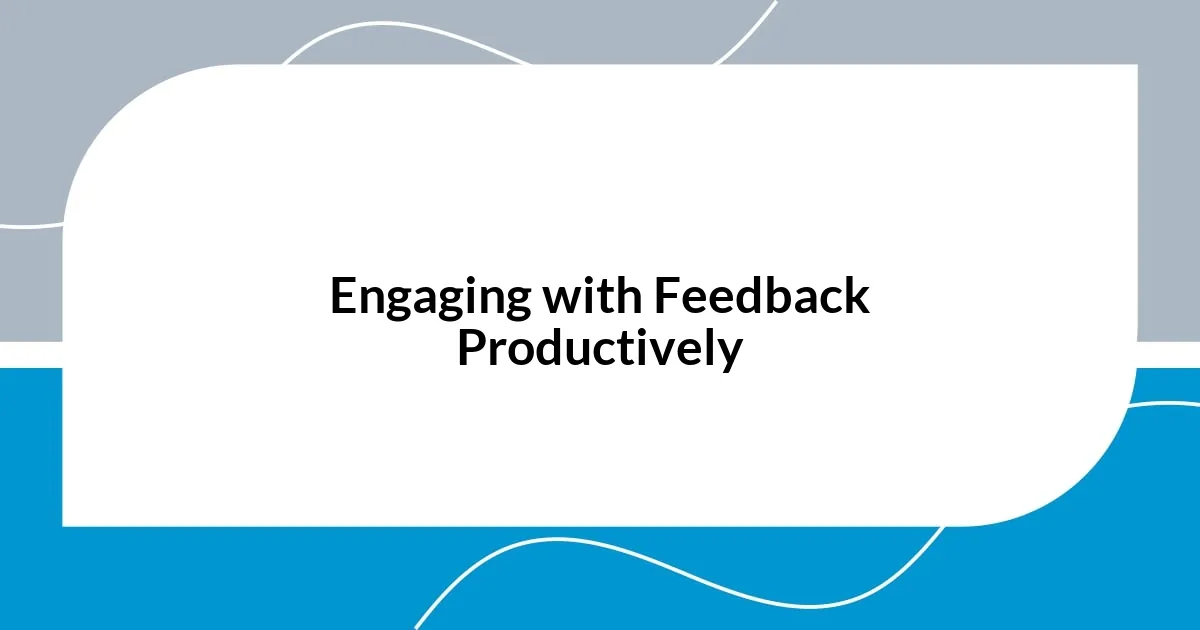
Engaging with Feedback Productively
One of the most enlightening moments I’ve experienced while engaging with feedback was when I realized that taking a step back could lead to greater insights. I remember receiving feedback that felt overly critical; instead of reacting defensively, I allowed myself a moment to breathe and truly consider the comments. It struck me then how important it is to view feedback as an opportunity for growth rather than a personal indictment. Have you ever felt your first instinct is to excuse or defend your work? I’ve been there, and I’ve learned that embracing the feedback can actually bolster your writing skills.
I find that discussing feedback openly makes the process more productive. In one session, after sharing my draft, I felt nervous about revealing certain vulnerabilities in my writing. However, my peer’s genuine interest and encouragement helped me see that everyone grapples with self-doubt. It created a safe space for both of us, allowing us to explore thoughts and ideas without the fear of judgment. I learned that fostering an open dialogue can turn potentially uncomfortable situations into valuable discussions that enrich the writing experience for everyone involved.
Another vital aspect of engaging with feedback is the importance of follow-up. After a particularly insightful session, I took the time to reflect on the suggestions and implemented changes in my draft. I reached out to my peer afterward to share how their feedback shaped my revision. That simple act not only deepened our connection but also emphasized the notion that peer editing doesn’t end with comments; it’s about collaboration and mutual investment in each other’s success. Have you ever thought about how feedback can be a continuous loop rather than a one-time event? That realization has transformed how I approach peer reviewing.
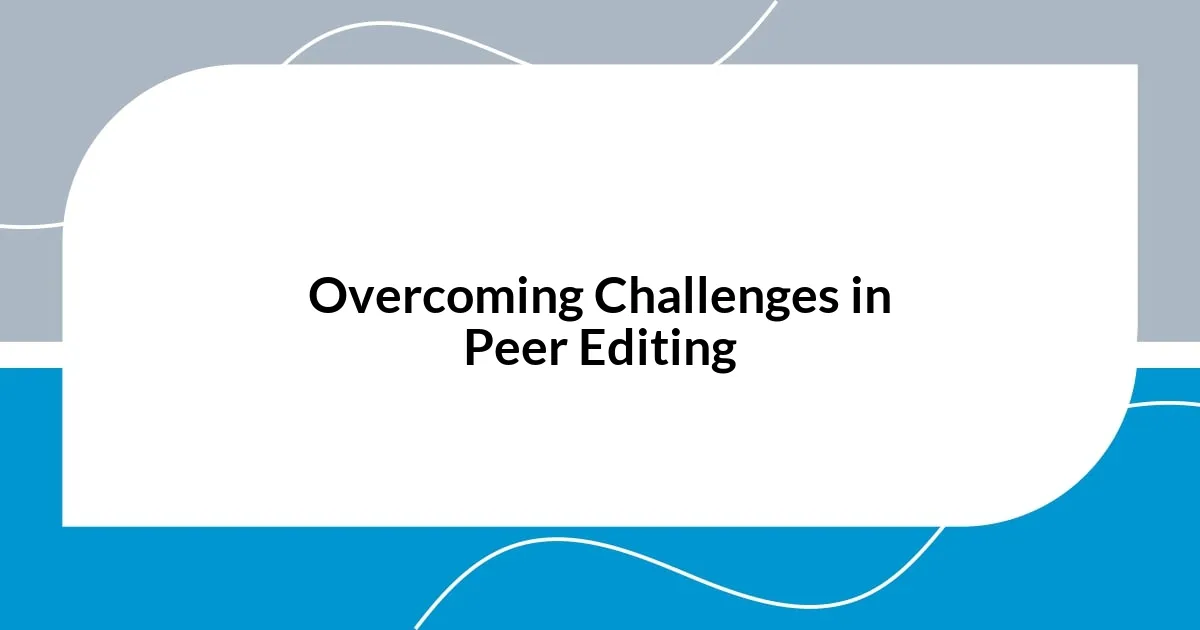
Overcoming Challenges in Peer Editing
One challenge I’ve faced in peer editing is addressing differing levels of experience. Sometimes, I find myself paired with someone who lacks confidence or knowledge about the subject matter. I vividly recall a session where my peer seemed overwhelmed and uncertain about fundamental concepts, and I felt compelled to offer guidance without sounding condescending. I approached the feedback like a conversation—inviting questions and providing gentle explanations, which not only boosted their confidence but also enriched my understanding of the material.
Navigating emotional responses can also be tricky in peer editing. I’ve noticed that it’s easy to take feedback too personally. In my early experiences, I struggled with this; I remember feeling my stomach drop when a peer pointed out major flaws in my argument. But over time, I learned to separate myself from my work. This shift in mindset transformed my approach—now, when I receive critiques, I actively remind myself that it’s not about me; it’s about improving the writing. How do you handle the emotional aspect of receiving feedback? I’ve found that grounding myself in the idea of growth makes all the difference.
Another hurdle lies in maintaining a balance between honesty and kindness during critiques. Early on, I sometimes held back my honest opinions to avoid hurting feelings, but I later realized that this can be more damaging in the long run. One instance stands out: a peer asked for my thoughts on a sensitive topic they had tackled. After some reflection, I chose to deliver my feedback candidly but compassionately. This honesty sparked an incredible discussion about the nuances of the subject, ultimately leading to a much stronger piece. I’ve come to appreciate that honest feedback, delivered thoughtfully, can pave the way for deeper discussions and improved writing. How do you share hard truths while preserving relationships? It’s a delicate balance, but one worth striving for.